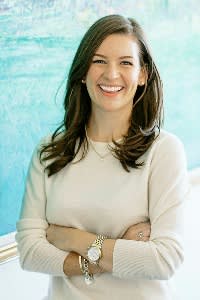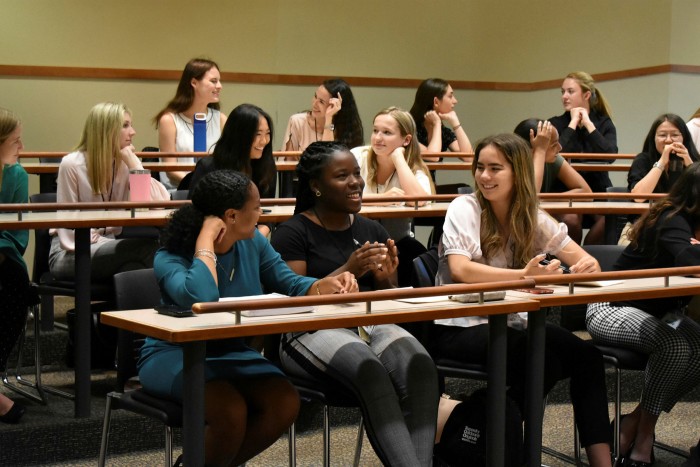Business schools push to help more women into finance
Kathy Matsui’s new worldwide venture money fund drew headlines previous month for being the very first of its variety in Japan to target on environmental, social and governance principles.
But the news was also major for a further purpose. Matsui, who still left expenditure bank Goldman Sachs in Japan previous calendar year and is identified for coining the term “womenomics”, is a lady at the helm of an all-woman management team — a rarity in the male-dominated finance business.
Business enterprise faculties are striving to transform this. To maximize the reduced selection of women in senior finance roles, some faculties are on a thrust to enable dismantle the boundaries to their progression. They are striving a selection of methods — ranging from new curriculum structure to on-campus and alumni networks.
For several, the very first obstacle is to persuade younger women that careers in this industry are welcoming and gratifying. “A ton of it stems from misinformation about what the earth of finance actually is,” suggests Haley Parrin, who just lately graduated from UNC Kenan-Flagler Business enterprise Faculty. She was the very first woman president of the school’s Financial commitment Banking Club, which allows MBA pupils get ready for operating in finance.

She argues that jobs in the business are usually mis-characterised as selection crunching while, in simple fact, the get the job done requires strategic thinking. Parrin labored in business enterprise assessment and consulting right before commencing her MBA class.
“What goes on previously mentioned and over and above [selection-crunching] is much much more critical than just obtaining the figures proper,” suggests Parrin, who will be joining expenditure bank Morgan Stanley in July. “That ability established is a little something a ton of women have to provide but really don’t know how to utilize to the economical solutions earth.”
Katherine Jollon Colsher, chief govt of Ladies Who Commit, a non-profit organisation operating to maximize the selection of women in senior asset administration roles, agrees. “It’s a career that is not usually recognized,” she suggests. “People communicate about being a law firm, a doctor or a teacher — but considerably less so about being a portfolio supervisor.”

But while perceptions are shifting, the notion of male-only boardrooms and lone woman analysts persists in the well-known creativeness, suggests Kathy Harvey, affiliate dean for degree programmes at the University of Oxford’s Saïd Business Faculty. “It can take several several years to transform tradition and anticipations.”
She argues that business enterprise faculties, as educators of probable finance leaders, are very well positioned to accelerate a change in tradition and anticipations. Their role consists of offering younger women a place to investigate their foreseeable future careers with “a perception of confidence and a perception that they really can go anywhere they want to”.
Jennifer Bethel, a finance professor at Babson University in the US, suggests faculties can also enable “normalise” the presence of women in finance. Some 50 for each cent of Babson’s finance professors are women, she provides. “Thirty several years ago, you didn’t have women finance professors and now you have a ton of them,” she suggests.
Even a tiny transform — she phone calls it a “one-inch deep” change — can make a distinction. A person example she gives is a case study protagonist obtaining a woman identify. “That’s a action forward,” she suggests. “But then it’s about acquiring [genuine scenarios on] companies that are owned and operated by women.”
Business enterprise faculties can also contact on woman alumni operating in finance to carry other senior women in the business into classes.
Saïd’s private fairness elective classes have attempted to do just that, suggests Harvey. “[It] improvements the environment in the space and the character of anticipations.”
An uphill struggle
In the Uk, women hold 17 for each cent of senior roles in the economical solutions sector, a proportion that has hardly improved considering that 2005, according to the Economic Carry out Authority, the industry regulator. In the US, according to Morningstar research, at the close of 2019 just fourteen for each cent of fund professionals were being women — a determine that experienced not improved considering that 2000.
These measures seem to be shelling out off: the proportion of the school’s woman graduates going into finance roles rose from 37 for each cent in the class of 2018-2019 to forty seven for each cent in the class of 2019-2020.
However, Bethel argues that increasing awareness of finance as a promising occupation for women ought to commence while they are youngsters continue to at university.
She cites the Economic Wellness Application, a community assistance programme run by the Babson Finance Affiliation. Its associates — two-thirds of whom are women, she suggests — educate simple personalized finance abilities at faculties in underprivileged communities.
A lot more stories from this report
“You have these wonderful women in front of these superior-university kids,” suggests Bethel, who is also co-founder of the Babson Economic Literacy Project. “Creating this chain is critical, so they can consider what [the finance sector] is,” she suggests.
Meanwhile, the rise of ESG-focused investing is serving to to appeal to and maximize the selection of woman finance executives.
Among 2015 and 2020, for example, 44 for each cent of the senior ESG positions that Acre Methods, a specialist govt lookup consultancy, helped to fill went to women.
“Already women are connecting to sustainability — and now there is a finance lens with that,” suggests Bethel.
